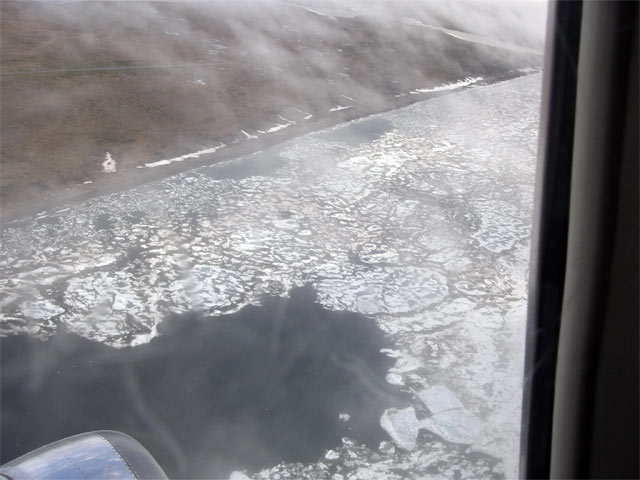( Log In ) Log In is for TREC Teachers & Researchers only
  |
| Tracy_Alley |
 Jun 28 2006, 04:37 AM Jun 28 2006, 04:37 AM
Post
#1
|
 Advanced Member    Group: TREC Team Posts: 43 Joined: 12-April 06 Member No.: 26 |
On Monday, June 26th, I left Toolik Lake Research Station at 6:30am. I had a great learning experience during my time at Toolik which I will never forget. There were so many spectacular adventures that will be etched in my memory forever.
We drove the “Toolik Taxi” (Ford truck) to Prudhoe Bay, Alaska which is also called Deadhorse. It was a three hour drive, but it seemed so fast compared to the drive from Fairbanks to Toolik Lake which was twelve hours. When I arrived at Deadhorse, the driver allowed me to photograph the sign that states we made it to the end of the Dalton Highway.  After I dropped my luggage at the airport, I headed to the Prudhoe Bay Hotel which is the only place that serves lunch in the very small town. In Prudhoe Bay, there is a mini airport (pictured below) as well as two small “hotels” and one building containing a general store, post office, movie rental business, and Napa Auto Parts. That is all that exists here except the oil fields. The United States Census Bureau reports that there are five residents in Deadhorse. There are only eight places in the nation with five people or less!  After lunch, I walked to the Arctic Caribou Inn to take the tour of the oil fields and to touch the Arctic Ocean. I was required to call a week in advance so I could obtain security clearance into the oil fields. This is required of everyone. The picture below shows our tour vehicle outside of the Arctic Caribou Inn.  During the tour, we saw lots of species of birds and herds of caribou roaming the oil field property. There are 3,500 workers who work at the oil fields. They work two weeks a month then fly home to rest for two weeks. This is their schedule every month. The workers see polar bears, grizzly bears, musk ox and wolves frequently. However, we were unable to see any of these animals today. We drove eight miles to see the Arctic Ocean. The following picture shows me sticking my hand in the thirty-five degrees Fahrenheit water. One boy in his twenties jumped into the water. I wanted to ask him if he heard of the word hypothermia, but I restrained.    After the tour of the oil fields and Arctic Ocean, I headed to the airport. We left Deadhorse/Prudhoe Bay to fly to Barrow which is a town of 4,500 people at the top of Alaska. The flight lasted an hour. The picture below shows the partially frozen Arctic Ocean (smallest of the world’s oceans) and some of the coastline as we flew into Barrow.  After the short stop in Barrow, we headed to Fairbanks which was about an hour and a half flight. We had a layover in Fairbanks before we left for Minneapolis, Minnesota. We arrived in Minneapolis at 5:30am. There was a one hour layover before the two hour flight to Cincinnati. I was so thrilled to see the Ohio River and the Greater Cincinnati/Northern Kentucky International Airport. I had a fabulous trip to Alaska, but I was happy to be in “The Buckeye State”. I learned a great deal of useful information which I will share with my students and the surrounding community. I would like to thank ARCUS especially Janet Warburton and the technology crew, VECO, Michelle Mack, Jennie DeMarco, Syndonia Bret-Harte, Peter Ray, and the National Science Foundation. Thank you so much! The podcast interview with Michelle Mack is available at the iTunes store or you can download my interview with Michelle from the ARCUS website. I would like to thank each one of you who followed my journey, supported me with e-mails, and viewed my photos. I greatly appreciate each of you! Cool facts about Alaska: There are 10,000 rivers and streams in Alaska. There are three million lakes larger than 20 acres in Alaska. Fifty-seven Alaskan volcanoes are in the Pacific “Rim of Fire”. Alaska has a glacier larger than Rhode Island. I need to make a correction in my earlier trivia section regarding the coastline. There are 33,904 miles of coastline. Some of the products made from oil: antifreeze, balloons, ballpoint pens, bandages, cameras, cassettes, combs, crayons, credit cards, electrical tape, footballs, glue, hair curlers, ice cube trays, lipstick, luggage, parachutes, refrigerator linings, shoe polish, shower doors, tennis rackets, tents, tires, and trash bags. There are so many more items, but I wanted to share a short list. |
  |
2 User(s) are reading this topic (2 Guests and 0 Anonymous Users)
0 Members:

|
NSF Acknowledgment & Disclaimer | Time is now: 9th November 2024 - 01:58 PM |
Invision Power Board
v2.1.7 © 2024 IPS, Inc.








